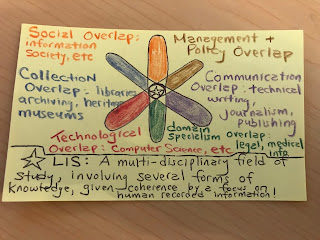- or the -
⛓creation,
⛓dissemination,
⛓collection,
⛓storage,
⛓organization,
⛓indexing and classification,
⛓processing,
⛓retrieval,
⛓communication,
⛓use,
⛓and preservation of information.
⛓dissemination,
⛓collection,
⛓storage,
⛓organization,
⛓indexing and classification,
⛓processing,
⛓retrieval,
⛓communication,
⛓use,
⛓and preservation of information.
While some specialists like a journalist will focus solely on, say, communicating information, an LIS practitioner (or for brevity's sake, a librarian) is concerned with ALL aspects of the communication chain and is essentially in charge of keeping each component well-oiled. This is the takeaway from my first two weeks at library school.
- Should libraries double-up as homeless shelters and daycare centers since that is how patrons are using them? Or would such an explicit move dilute their mission?
- Which books to retire or weed, which books to keep, which books to showcase, and which books to purchase?
- How to make sure that services are available to people with disabilities when budgets are incredibly tight?
The ethical quandaries in the 'I' part of LIS are more cumbersome and urgent and continue to grow in force and number like strains of Medusa's hair. Read my notes below:
Sam Tarly in Game of Thrones
Being intimate with ALL aspects of the communication chain of recorded information is not the only way that a librarian can prove her generalist credentials. LIS is not a discipline but a meta-discipline. It has its fingers in nearly every pot and is more akin to something like philosophy (for proof, see the beautiful artwork below). In a day's work, a librarian can go from working on safety evacuation documents (Management and Policy Area) to advertising a book club for retirees (Social Area and Communications Area) to updating an Excel spread sheet of patron information (Technological Area).
LIS overlaps constantly with other disciplines
This is why, for all intents and purposes, the first skill, even the first trait, that a librarian-in-training should bring to the table is that of resourcefulness. Without resourcefulness, you have nothing. You must be nimble on your feet and quick in your mind. Go wide or go home.
In a way, it's almost as if a librarian is multi-lingual. She need not be fluent in any particular tongue but should know enough of each of the major "languages" in order to respond swiftly and accurately to any of her patrons' requests.
Let us consider an example. And for this example's argument, please make believe we are not living in fraught political times. Say you have a Syrian immigrant who wants to get hooked up with residency resources within the borough of Haringey. So he heads into one of the borough's branches and approaches his first librarian whom he sees. How should she proceed in helping him?
1.) The first thing she would do is have a translator service like Bing Translator active on her desktop should there be any gaps in communication.
2.) Next she should provide more formal and legal residency resources such as the contact info, webpages and phone numbers of the UK Home Office and the Haringey council services.
3.) The next thing to do is to check her own library's resources about residency workshops and English language classes.
4.) Finally, with any sort of big move, finding a flat and a community are paramount. Based on her own street experience, the librarian would point the patron to housing search services like RightMove and/or SpareRoom as well as to Meet-Ups to find resources for new arrivals for language-learning, employment, and socializing. If the new arrival wants more face-to-face contact, the librarian should suggest popping into cafes and stores in Wood Green where there is a large Turkish and Arabic community - what we call "shoe-leather" research.
--------------------------------------
Let us consider an example. And for this example's argument, please make believe we are not living in fraught political times. Say you have a Syrian immigrant who wants to get hooked up with residency resources within the borough of Haringey. So he heads into one of the borough's branches and approaches his first librarian whom he sees. How should she proceed in helping him?
Parker Posey as Mary, a clubkid-turned-librarian, in Party Girl (1995)
1.) The first thing she would do is have a translator service like Bing Translator active on her desktop should there be any gaps in communication.
2.) Next she should provide more formal and legal residency resources such as the contact info, webpages and phone numbers of the UK Home Office and the Haringey council services.
3.) The next thing to do is to check her own library's resources about residency workshops and English language classes.
4.) Finally, with any sort of big move, finding a flat and a community are paramount. Based on her own street experience, the librarian would point the patron to housing search services like RightMove and/or SpareRoom as well as to Meet-Ups to find resources for new arrivals for language-learning, employment, and socializing. If the new arrival wants more face-to-face contact, the librarian should suggest popping into cafes and stores in Wood Green where there is a large Turkish and Arabic community - what we call "shoe-leather" research.
--------------------------------------
A librarian does not live on resourcefulness alone, however. She needs to be driven by a sense of duty and ethics, for the field is littered with ethical landmines.
The L or Library side of the equation, seemingly, has fewer ethical concerns (although one could make a parlor game coming up with all the current issues that plague public libraries). The known ethical issues in library may seem prosaic but they are quite entrenched; remedies depend more on a community response rather than the good conscience of a librarian. Examples follow:
- How to deal with funding cuts or austerity measures in a world that needs information literacy more than ever?
- Should libraries double-up as homeless shelters and daycare centers since that is how patrons are using them? Or would such an explicit move dilute their mission?
- Which books to retire or weed, which books to keep, which books to showcase, and which books to purchase?
- How to make sure that services are available to people with disabilities when budgets are incredibly tight?
The ethical quandaries in the 'I' part of LIS are more cumbersome and urgent and continue to grow in force and number like strains of Medusa's hair. Read my notes below:
Just a few ethical issues raised in LIS
To which, any sane LIS student reverts to a bit of Edvard Munch:
By Edvard Munch - National Gallery of Norway
Or, better yet, Janet Leigh:
After the obligatory panic attack, it's important to remember that a good librarian will be on the side of integrity, transparency, and civic-mindedness. Should she do her job well she'll need a strong sense of ethics (or at least a solid understanding what the ethical issues in LIS are) as well as the trait of resourcefulness, either natural or learned. Her patrons are depending on this.
Or, better yet, Janet Leigh:
Famous Shower Scene in Hitchcock's Psycho
After the obligatory panic attack, it's important to remember that a good librarian will be on the side of integrity, transparency, and civic-mindedness. Should she do her job well she'll need a strong sense of ethics (or at least a solid understanding what the ethical issues in LIS are) as well as the trait of resourcefulness, either natural or learned. Her patrons are depending on this.






In your examples it seems like you put a lot of the responsibility on the librarian, which is understandable because there is a lot that we are responsible for, but how much of the communication of needs and ability to communicate the patron needs falls on the librarian and how much rests on the patron? You mention the librarian having a translation service accessible for use, but is their also a responsibility for patrons to be able to at least try to communicate in a way that can be understood if, as in your refugee example, they aren't fluent in language that is primarily used in that country?
ReplyDelete"LIS is not a discipline but a meta-discipline. It has its fingers in nearly every pot and is more akin to something like philosophy".It seems that as a librarian, we should master knowledge on multi-discipline and woork on muli-tasking. May I say that a librarian is totally a "super hero"?
ReplyDeleteThis comment has been removed by the author.
ReplyDeleteYou bring up a lot of ethical issues that may face LIS professionals. In a way I think the example of helping the refugee is fairly straightforward as the librarian will know how to direct him to the resources he needs and support him if needed. Later you mention the issue of improving information literacy, which I feel is a lot more complex.
ReplyDeleteI'm presuming this is your DITA post, though it seems to respond more to the Foundation Module. That might be a theme among our cohort as we begin blogging about the studies and with the overlaps between the modules and discussions (I think mine blurs between the two a bit).
ReplyDeleteIt's fun to read, informative and chimes with some recent articles I read such as this one which you might find interesting if you haven't read it already: https://www.theguardian.com/commentisfree/2019/aug/02/closing-libraries-vulnerable-mental-health
Great to include notes/diagrams from the sessions. This crossed my mind, but seems more likely to happen in the group segments or within reflections, as I find I'm taking notes at such a pace at the same time as trying to listen and take everything in.
I never felt so aware of the many different aspects of an LIS role before starting this course! I love all the different hypothetical considerations you gave - it's definitely very interdisciplinary and different from day to day.
ReplyDeleteWhat I would say is that, since LIS is so broad, there's also room to consider other roles aside from that of the public librarian. Other positions will see a different customer base and face different queries.
First of all thanks Thomas I enjoyed this post. I think you are right that resourcefulness is a key trait for everyone who is looking to take advantage of our crowded and disparate information environment.
ReplyDeleteI think even in the case of the librarian dealing with a specific query (information retrieval and communication) there is plenty more to interest us. One example is why choose Bing instead of Google translate? Machine learning, where programs are “taught” using vast amounts of data and the results affect how we comprehend those around us, seems like a good topic. How was the choice of one above the other made? Personal preference, accuracy/ease of the service or advertising influence?
I also agree with Tom above— really liked the inclusion of your diagrammatic notes for communicating information that it might have been clunky to express as pure text. I think I might try and steal that for the future.
Really nice post. I enjoyed your topic that focuses on different ethical issues;e.g language.It is true that librarian has a lot of responsibilities whereas the resources are very limited.Sometimes even they don’t have access in decision making level.I am agree with the fact that you have pointed ‘bing translator’.But its just a dream. I wish that sufficient budget could be used towards librarian’s training and education to develop our community ( e.g. refugees).
ReplyDelete